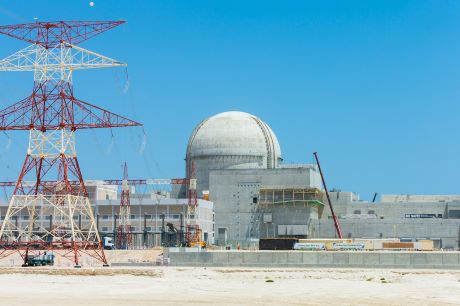Barakah 2 completes cold testing
25 July 2017
Cold hydrostatic testing has been completed at unit 2 of the Barakah nuclear power plant in the United Arab Emirates. Cold hydrostatic testing verifies that the welds, joints, pipes and components of the reactor coolant system and associated high-pressure systems meet the requirements set by the UAE's Federal Authority for Nuclear Regulation (FANR).
 |
| Barakah unit 2 (Image: Enec) |
The testing was preceded by integrated flushing of the unit's nuclear steam supply systems. This involved flushing the system with demineralised water before the installation of the reactor vessel head and reactor coolant pump seals. Testing began using previously processed water to fill the primary circuit, circulated by the reactor coolant pumps.
Detailed system inspections to verify that all components and piping systems functioned as originally designed were carried out by teams from reactor designer Korea Electric Power Corporation (Kepco), engineering, procurement and construction contractor Korea Hydro and Nuclear Power, and the FANR. Tests were also carried out by staff from the Emirates Nuclear Energy Corporation (Enec) and Nawah Energy Company - the Enec subsidiary, partially owned by Kepco, that will operate the Barakah plant.
Enec CEO Mohamed Al Hammadi said the cold hydrostatic testing of unit 2 was "of great significance" to the Barakah project. "As the delivery of the four nuclear units progresses, we ensure that all of the organisations working on the Barakah plant, the biggest nuclear construction project in the world, continuously look to improve the delivery of our program through our acquired knowledge from preceding tests, units and works; making our project more quality and safety driven, as well as efficient," he said.
Four AP1400 units are under construction at Barakah in the Al Dhafra region of Abu Dhabi. Initial construction activities at Barakah 1 were completed in May and the unit is scheduled to start operations in 2018. Construction of unit 2 began in 2013 and the unit is now over 85% complete. Overall, the four-unit project is around 82% complete.
Researched and written
by World Nuclear News